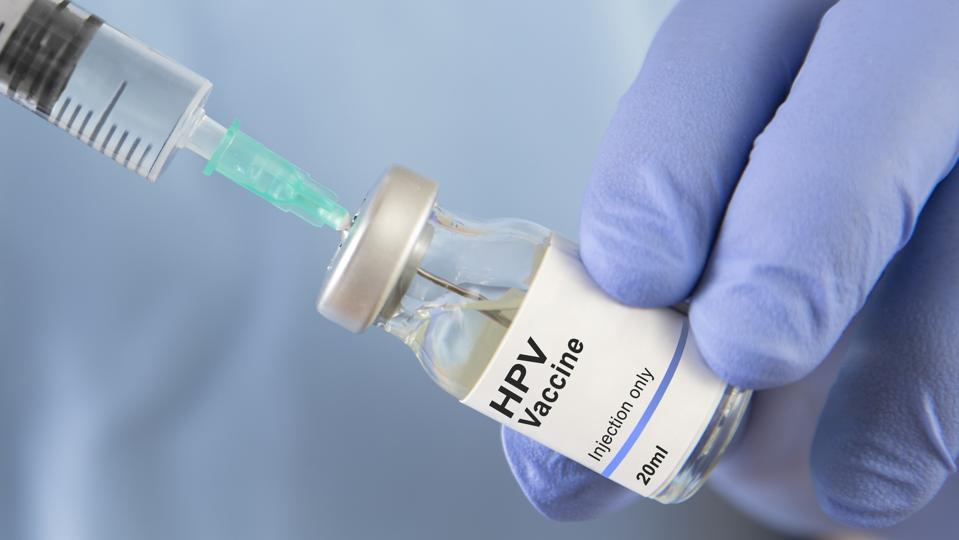Topline
HPV vaccination rates are the lowest among Hispanics, males and Americans with low education levels, according to a new study, and the reasons may include lack of knowledge surrounding HPV— including a misconception that it’ a women’s vaccine.
Key Facts
The human papillomavirus (HPV) is the most common sexually transmitted infection in the U.S., and although it can lead to certain types of cancers later on in life, most infections go away on their own without symptoms.
The HPV vaccine was initially recommended by the Food and Drug Administration for use in children between 11 and 12, and for catch-up vaccinations for those up to 26 years old, but the FDA expanded use in adults between 27 and 45 in 2018.
The researchers reviewed health data between 2018 and 2019 from 9,440 participants aged 27 to 45, and discovered males, Hispanics and lower-income participants were the least likely to be vaccinated against HPV, according to the study published Thursday in Human Vaccines & Immunotherapeutics.
Women were three times more likely to be vaccinated compared to men, and Nosayaba Osazuwa-Peters, lead author and a head and neck cancer epidemiologist at the Duke University School of Medicine, said in a statement men are “in particular need of increased knowledge of the vaccine,” since anal and oropharyngeal cancer rates, which are known to originate from the HPV virus, are on the rise.
Only about 12% of Hispanic participants were vaccinated against HPV, and the researchers found they were 27% less likely to be vaccinated compared to non-Hispanic whites, while non-Hispanic Blacks were 36% more likely to get vaccinated.
Participants who only had a high school diploma or who had finished some college were also less likely to be vaccinated compared to those with at least one degree, according to the study.
Big Number
42 million. That’s how many Americans are infected with the types of HPV known to cause disease, according to the Centers for Disease Control and Prevention. Around 13 million American adults and children are infected each year.
Key Background
The HPV vaccine is a series of two or three shots, and was first approved in 2006 for only women, five years before it was approved for use in men. Because of this, the vaccine has historically been known as a women’s only vaccine, though men also benefit from it, according to a study published in Preventive Medicine. HPV can cause several types of cancers like cervical and vaginal, but the most common type of cancer it leads to is oropharyngeal, according to the study, and 75% of patients diagnosed with this type of cancer are men. Although vaccination rates among Hispanic teens is high, coverage among Hispanic adults is low, a 2023 study found. The study chalks this up to potential misconceptions among the community, as Hispanic participants were 8% more likely to believe HPV-related misconceptions than non-Hispanic participants. A separate study found Hispanic men and women had the lowest knowledge of HPV, while non-Hispanic white women and men had the highest. The lack of awareness among those with lower education statuses may be the reason for lower vaccination rates. Only 40% of adults with less than a high school education are aware of HPV, compared to 78% of adults with a college degree or higher, a JAMA Network Open study found.
Tangent
Religious reason may also be the cause of low HPV vaccination rates, as some religious leaders advise against getting vaccinated since they believe it promotes premarital sex, according to a Current Oncology study. Research also shows the Covid pandemic may have affected HPV vaccination rates. Researchers examined HPV vaccination rates in young adults in 2018, 2019 and 2022, and found that although rates increased between 2018 and 2019, there was no significant change between 2019 and 2022. They concluded the pandemic disrupted young adults from starting the shot series. Overall negative sentiments toward vaccines following the Covid pandemic may also play a role. Some 3% of kids entering kindergarten for the 2022-2023 school year had exemptions for vaccination, which is the highest rate ever reported in U.S. history. Although health agencies have found the coronavirus vaccines to be safe and effective, experts believe the uptick of vaccine exemptions among children is related to skepticism of the updated Covid vaccines approved for use in 2023. Public perception of the importance of childhood vaccines declined in 52 out of 55 countries studied during the Covid pandemic, according to UNICEF.

